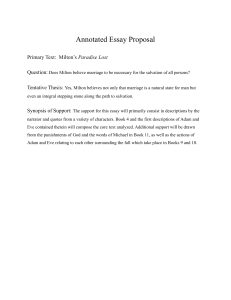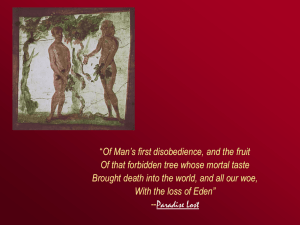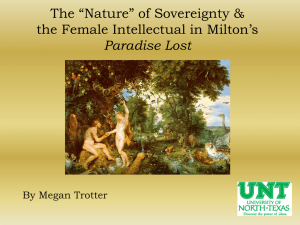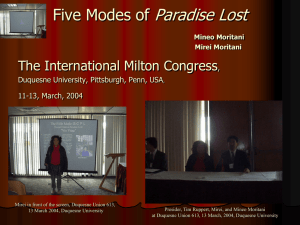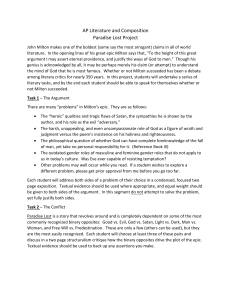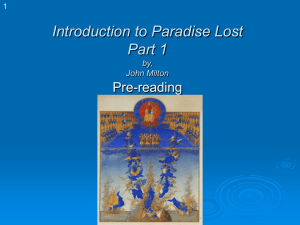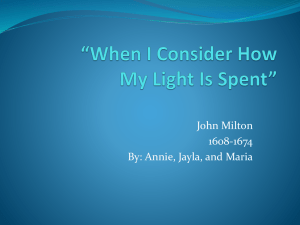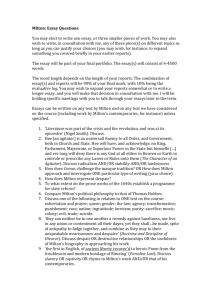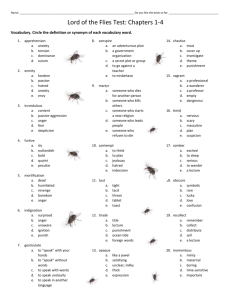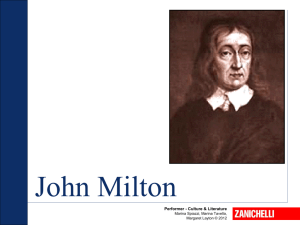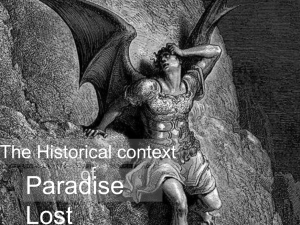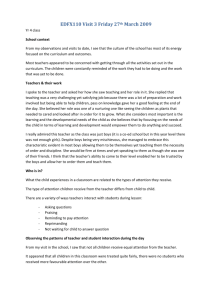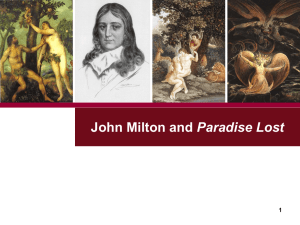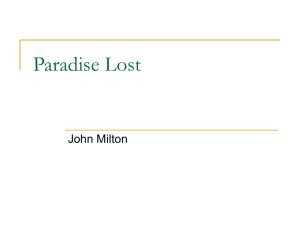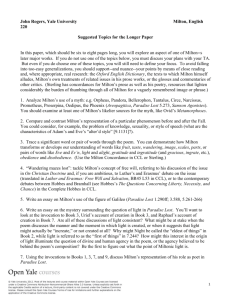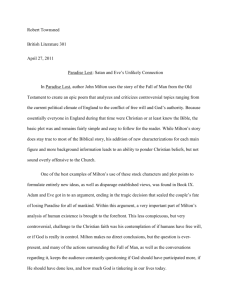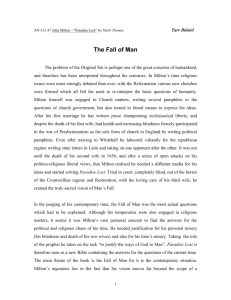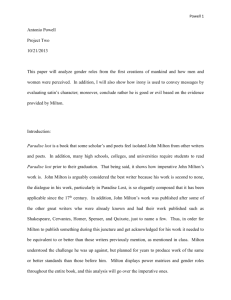Civilization to Savagery
advertisement
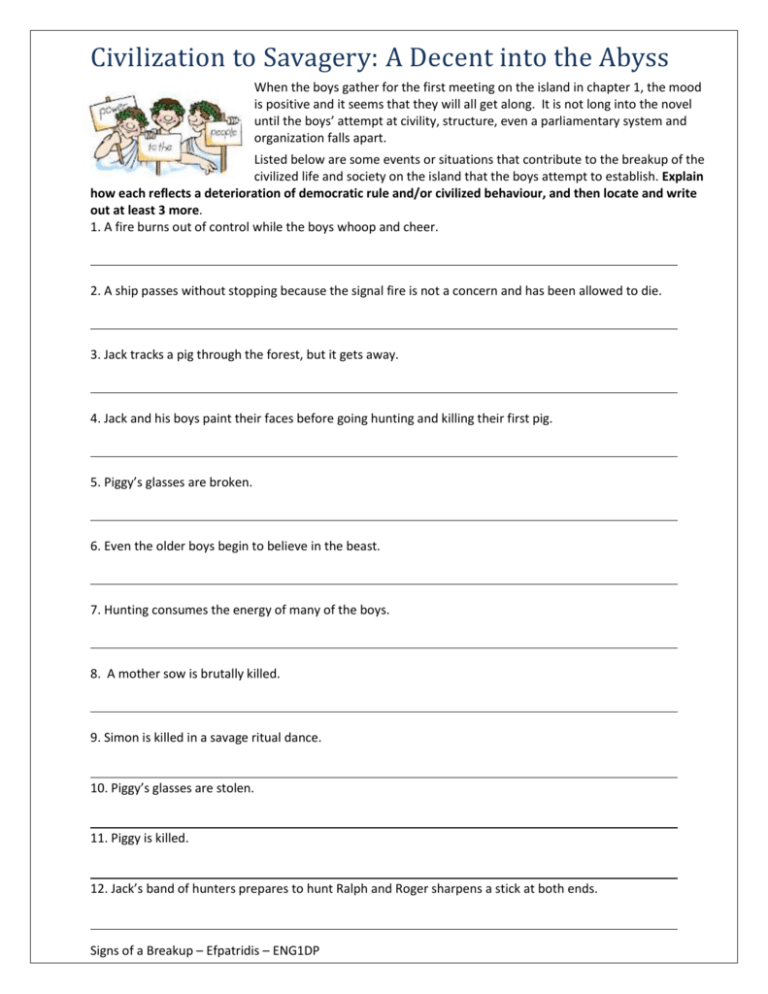
Civilization to Savagery: A Decent into the Abyss When the boys gather for the first meeting on the island in chapter 1, the mood is positive and it seems that they will all get along. It is not long into the novel until the boys’ attempt at civility, structure, even a parliamentary system and organization falls apart. Listed below are some events or situations that contribute to the breakup of the civilized life and society on the island that the boys attempt to establish. Explain how each reflects a deterioration of democratic rule and/or civilized behaviour, and then locate and write out at least 3 more. 1. A fire burns out of control while the boys whoop and cheer. 2. A ship passes without stopping because the signal fire is not a concern and has been allowed to die. 3. Jack tracks a pig through the forest, but it gets away. 4. Jack and his boys paint their faces before going hunting and killing their first pig. 5. Piggy’s glasses are broken. 6. Even the older boys begin to believe in the beast. 7. Hunting consumes the energy of many of the boys. 8. A mother sow is brutally killed. 9. Simon is killed in a savage ritual dance. 10. Piggy’s glasses are stolen. 11. Piggy is killed. 12. Jack’s band of hunters prepares to hunt Ralph and Roger sharpens a stick at both ends. Signs of a Breakup – Efpatridis – ENG1DP What other events mark the degeneration of the boys and reveals their loss of innocence and archetypal fall from grace? 13. 14. 15. The following quotations are from Paradise Lost by John Milton. Explain how each connects to at least one of the situations listed above. "Farewell happy fields Where Joy for ever dwells: hail horrors, hail Infernal world" (1.249-51). "advise him of his happy state— Happiness in his power left free to will, Left to his own free will, his will though free Yet mutable" (5.234-7). "Firm they might have stood, Yet fell; remember, and fear to transgress" (6.910-1). "So will fall He and his faithless progeny. Whose fault? Whose but his own? Ingrate! He had of Me All he could have; I made him just and right, Sufficient to have stood, though free to fall" (3.95-9). Paradise Lost is about Adam and Eve—how they came to be created and how they came to lose their place in the Garden of Eden, also called Paradise. It is the story of Genesis, expanded by Milton, into a very long, detailed, narrative poem. It also includes the story of the origin of Satan. Originally, he was called Lucifer, an angel in heaven who led his followers in a war against God, and was ultimately sent with them to hell. Thirst for revenge led him to cause man's downfall by turning into a serpent and tempting Eve to eat the forbidden fruit. Milton tells us how important freedom and choice are; there is no such thing as fate or predestination in the world he describes. Now, to review for a moment, predestination is an idea held by some Protestants which claims that everyone is already predestined for salvation (Heaven) or damnation (that would be Hell) when they're born. So the idea is that people are either born good or bad. According to this belief, there is nothing a person can do to escape his or her fate in the next life (good works, charity, penitence and the like won't get anybody into Heaven because everything has already been decided). For Milton, God doesn't predestine anybody, and his God's "ways" turn out to be just reactions to human decisions: God banishes Adam and Eve out of the Garden of Eden and evil enters the world because Adam and Eve broke the rules. Simple as that. In Paradise Lost the point is not that Adam and Eve were unlucky or unjustly treated; they knew the rules and were given the gift of freedom of choice; they were "free to fall," as Milton's God puts it. It's more meaningful and more significant if there is temptation that must be resisted; virtue, Milton feels, is nothing if it isn't tested. The same is true in real life; how can we know how good someone is if we don't know how they respond to "bad" or "sinful" things? And so in the text, we see the nature of humans when tested? You may not agree with Milton's ideas, and you may not believe what he believes, but thinking about our own freedom of choice is important. Milton challenges us to define our own views on this, and what we believe shapes our everyday actions. While it may seem "mean" to sit by and watch people suffer or make bad decisions, Milton suggests that only a God willing to give people free will can be considered good and "justified." Signs of a Breakup – Efpatridis – ENG1DP
